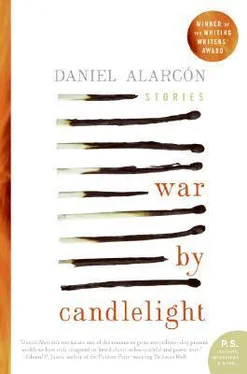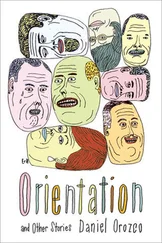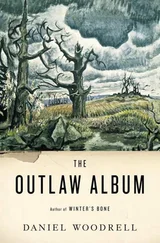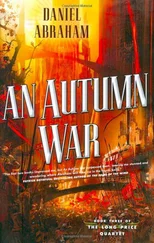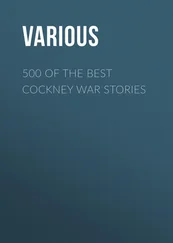Daniel Alarcon - War by Candlelight - Stories
Здесь есть возможность читать онлайн «Daniel Alarcon - War by Candlelight - Stories» весь текст электронной книги совершенно бесплатно (целиком полную версию без сокращений). В некоторых случаях можно слушать аудио, скачать через торрент в формате fb2 и присутствует краткое содержание. Год выпуска: 2006, Издательство: Harper Perennial, Жанр: Современная проза, на английском языке. Описание произведения, (предисловие) а так же отзывы посетителей доступны на портале библиотеки ЛибКат.
- Название:War by Candlelight: Stories
- Автор:
- Издательство:Harper Perennial
- Жанр:
- Год:2006
- ISBN:нет данных
- Рейтинг книги:4 / 5. Голосов: 1
-
Избранное:Добавить в избранное
- Отзывы:
-
Ваша оценка:
- 80
- 1
- 2
- 3
- 4
- 5
War by Candlelight: Stories: краткое содержание, описание и аннотация
Предлагаем к чтению аннотацию, описание, краткое содержание или предисловие (зависит от того, что написал сам автор книги «War by Candlelight: Stories»). Если вы не нашли необходимую информацию о книге — напишите в комментариях, мы постараемся отыскать её.
is an exquisite collection of stories that carry the reader from Third World urban centers to the fault lines that divide nations and people — a devastating portrait of a world in flux — and Daniel Alarcón is an extraordinary new voice in literary fiction, one you will not soon forget.
War by Candlelight: Stories — читать онлайн бесплатно полную книгу (весь текст) целиком
Ниже представлен текст книги, разбитый по страницам. Система сохранения места последней прочитанной страницы, позволяет с удобством читать онлайн бесплатно книгу «War by Candlelight: Stories», без необходимости каждый раз заново искать на чём Вы остановились. Поставьте закладку, и сможете в любой момент перейти на страницу, на которой закончили чтение.
Интервал:
Закладка:
city of clowns
When I got to the hospital that morning, I found my mother mopping floors. My old man had died the night before and left an outstanding bill for her to deal with. They’d had her working through the night. I settled the debt with an advance the paper had given me. I told her I was sorry and I was. Her face was swollen and red, but she wasn’t crying anymore. She introduced me to a tired, sad-looking black woman. “This is Carmela,” she said. “Your father’s friend. Carmela was mopping with me.” My mother looked me in the eye, as if I was supposed to interpret that. I did. I knew exactly who the woman was.
“Oscarcito? I haven’t seen you since you were this big,” Carmela said, touching the middle of her thigh. She reached for my hand, and I gave it to her reluctantly. Something in that comment bothered me, confused me. When had I ever seen her? I couldn’t believe she was standing there in front of me.
At the velorio, I picked out my half brothers. I counted three. For twelve years I had insulated myself from my old man’s other life — since he left us, right after my fourteenth birthday. Carmela had been his lover, then his common-law wife. Petite, cocoa colored with blue-green eyes, she was prettier than I had imagined. She wore a simple black dress, nicer than my mother’s. We didn’t say much, but she smiled at me, glassy-eyed, as she and my mother took turns crying and consoling each other. No one had foreseen the illness that brought my father down.
Carmela’s sons were my brothers, that much was clear. There was an air of Don Hugo in all of us: the close-set eyes, the long arms and short legs. They were younger than me, the oldest maybe seventeen, the youngest about eleven. I wondered whether I should approach them, knew, in fact, that as the oldest I should. I didn’t. Finally, at the insistence of our mothers, we shook hands. “Oh, the reporter,” the oldest one said. He had my old man’s smile. I tried to project some kind of authority over them — based on age, I guess, or the fact that they were black, or that I was the real son — but I don’t think it worked. My heart wasn’t in it. They touched my mother with those light, careless touches that speak of a certain intimacy, as if she were a beloved aunt, not the supplanted wife. Even she belonged to them now. Their grief was deeper than mine. Being the firstborn of the real marriage meant nothing at all; these people were, in the end, Don Hugo’s true family.
At the paper the next day, I didn’t mention my father’s death to anyone but the obituary guy, whom I asked to run a notice for me, as a favor to my mother. “Is he a relative?” he asked, his voice noncommittal.
“Friend of the family. Help me out, will you?” I handed him a scrap of paper:
Hugo Uribe Banegas, native of Cerro de Pasco, passed into eternal life this past February 2 at the Dos de Mayo Hospital in Lima. A good friend and husband, he is survived by Doña Marisol Lara de Uribe. May he rest in peace.
I left myself and my brothers out of it. Carmela too. They could run their own obituary, if they wanted, if they could afford it.
In Lima, dying is the local sport. Those who die in phantasmagoric fashion, violently, spectacularly, are celebrated in the fifty-cent papers beneath appropriately gory headlines: DRIVER GETS MELON BURST or NARCO SHOOTOUT, BYSTANDERS EAT LEAD. I don’t work at that kind of newspaper, but if I did, I would write those headlines too. Like my father, I never refuse work. I’ve covered drug busts, double homicides, fires at discos and markets, traffic accidents, bombs in shopping centers. I’ve profiled corrupt politicians, drunken has-been soccer players, artists who hate the world. But I’ve never covered the unexpected death of a middle-aged worker in a public hospital. Mourned by his wife. His child. His other wife. Her children.
My father’s dying was not news. I knew this, and there was no reason for it to be surprising or troubling. It wasn’t, in fact. At the office, I typed my articles and was not bothered by his passing. But that afternoon Villacorta sent me out to do research on clowns, for a Sunday feature on street performers he’d assigned me a few weeks earlier. It may have been the mood I was in, but the idea of it made me sad: clowns with their absurd and artless smiles, their shabby, outlandish clothes. I’d walked only a few blocks when I felt inexplicably assaulted by loss. In the insistent noise of the streets, in the cackling voice of a DJ on the radio, in the glare of the summer sun, it was as if Lima were mocking me, ignoring me, thrusting her indifference at me. A heavyset woman sold red and blond wigs from a wooden cart. A tired clown rested on the curb, cigarette between his lips, and asked me for a light. I didn’t have the heart to interview him. The sun seemed to pass straight through me. My tiny family had been dissolved into another grouping, one in which I had no part.
In Lima, my father had settled on construction. He built offices, remodeled houses. He was good with a hammer, could paint and spackle, put up a wall in four hours. He was a plumber and locksmith. A carpenter and welder. When offered a job, he always answered in the same way. “I’ve done it many times,” he’d reassure a contractor while examining a tool he’d never seen before in his life. As a child, I admired my father and his hard work. Progress was something you could measure in our neighborhood: how fast the second floor of your house rose, how quickly you acquired the accoutrements of middle-class life. During the week, he worked on other people’s homes; on weekends, he worked on ours. Hard work paid off. We inaugurated a new stereo with a Hector Lavoe tape. We watched the ’85 Copa América on a fancy color television.
It was not all that transparent, of course. My father was vivo, quick to understand the essential truth of Lima: if there is money to be made, it must be bled from these stone and concrete city blocks. Some win and some lose, and there are ways to tilt the odds. He was charming, and he did good work, but he was always, always looking out for himself.
He was too restless to survive back home. Pasco, where he and my mother and I were born, is neither city nor country. It is isolated and poor, high on a cold Andean puna , but in a very specific way, it is urban: its concept of time is mechanized, and no one is spared by capitalism’s ticking clock. Pasco is not pastoral or agricultural. Men descend into the earth for ten-hour shifts. Their schedule is monotonous, uniform. They emerge — in the morning, the afternoon, or the evening — and start drinking. The work is brutal and dangerous, and in time, their life above ground begins to resemble life below: the miners take chances, they drink, they cough and expel a tarry black mucous. The color of money, they call it, and buy another round of drinks.
My old man wasn’t suited to those rituals. Instead he started driving trucks to the coast and into the city. He was twenty-nine when he married my mother, nearly a decade older than his young wife. He’d spent most of his twenties working in Lima, coming back only once every three or four months. Somehow a romance blossomed on his trips home. By the time they married, they’d been a couple for five years already, most of that time apart. I was born six months after the wedding. He went on coming and going for years, making a home for himself in the city, in the district of San Juan de Lurigancho. When my mother would no longer tolerate being left alone, he brought us here too.
That was, I think, the only good thing he did for us. Or for me. When I remember Pasco, that cold high plain, its thin air and sinking houses, I’m grateful to be here. I grew up in Lima. I went to university and landed a respectable job. There is no future in Pasco. Kids don’t study and anyway, are taught almost nothing. They inhale glue from brown-paper bags or get drunk in the weak morning light before school. In Lima, the skyline changes, a new building goes up, or one comes crashing down. It’s gritty and dangerous, but the city persists. In Pasco, the very mountains move: they’re gutted from the inside, stripped of their ore, carted away and reassembled. To see the earth move this way, to know that somehow, everyone you live with is an accomplice to this act; it’s too unsettling, too unreal.
Читать дальшеИнтервал:
Закладка:
Похожие книги на «War by Candlelight: Stories»
Представляем Вашему вниманию похожие книги на «War by Candlelight: Stories» списком для выбора. Мы отобрали схожую по названию и смыслу литературу в надежде предоставить читателям больше вариантов отыскать новые, интересные, ещё непрочитанные произведения.
Обсуждение, отзывы о книге «War by Candlelight: Stories» и просто собственные мнения читателей. Оставьте ваши комментарии, напишите, что Вы думаете о произведении, его смысле или главных героях. Укажите что конкретно понравилось, а что нет, и почему Вы так считаете.
